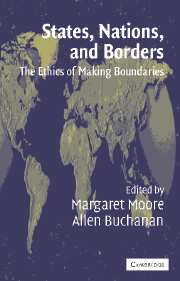Book contents
- Frontmatter
- Contents
- About the Contributors
- Acknowledgments
- 1 Introduction: The Making and Unmaking of Boundaries
- THE JEWISH TRADITION
- THE CONFUCIAN TRADITION
- THE CHRISTIAN TRADITION
- THE NATURAL LAW TRADITION
- THE ISLAMIC TRADITION
- THE LIBERAL TRADITION
- 12 The Making and Unmaking of Boundaries: What Liberalism Has to Say
- 13 Liberalism and Boundaries: A Response to Allen Buchanan
- THE INTERNATIONAL LAW TRADITION
- CONCLUSION
- Index
12 - The Making and Unmaking of Boundaries: What Liberalism Has to Say
Published online by Cambridge University Press: 24 November 2009
- Frontmatter
- Contents
- About the Contributors
- Acknowledgments
- 1 Introduction: The Making and Unmaking of Boundaries
- THE JEWISH TRADITION
- THE CONFUCIAN TRADITION
- THE CHRISTIAN TRADITION
- THE NATURAL LAW TRADITION
- THE ISLAMIC TRADITION
- THE LIBERAL TRADITION
- 12 The Making and Unmaking of Boundaries: What Liberalism Has to Say
- 13 Liberalism and Boundaries: A Response to Allen Buchanan
- THE INTERNATIONAL LAW TRADITION
- CONCLUSION
- Index
Summary
The Ethical Issues
How to Ignore Them
The making and unmaking of boundaries raises ethical issues because which side of a boundary people find themselves on can have profound consequences for their freedom, their welfare, their identity, and even their survival. Yet existing political theory, including liberal political theory, has remarkably little to say about the ethics of creating and changing boundaries. This deficiency stems from two shamelessly convenient simplifying assumptions. The first, which I call the congruence assumption, is that the membership boundaries of primary political communities and the geographical boundaries of primary political units (call them “states”) coincide. The second, which I call the perpetuity assumption, is that primary political units remain intact over time, that the only form of exit from existing states is by emigration (departure of people) rather than by fragmentation of the states themselves. Given these two assumptions, most of the more difficult ethical issues concerning the creation and changing of borders simply do not arise.
Liberalism, which at least in its contemporary forms prides itself on accommodating pluralism, does not assume that the populations of existing states are homogeneous in all respects. But at least until very recently, liberal theorists have tended to assume that whatever pluralism exists within states can be accommodated within states – that is, without changing their boundaries. Classical liberalism tended to assume that a regime of universal rights, including preeminently freedom of association, religion, and expression, and rights to private property, is sufficient to accommodate pluralism within the boundaries of the state.
- Type
- Chapter
- Information
- States, Nations and BordersThe Ethics of Making Boundaries, pp. 231 - 261Publisher: Cambridge University PressPrint publication year: 2003
- 34
- Cited by



